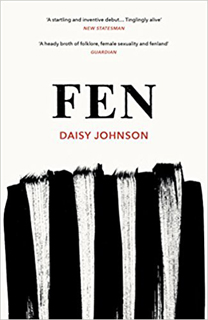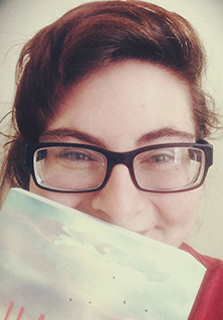
('Pond Reflections' © Rich Herrmann,2013)
A VIEW FROM A FEN
by A. POYTHRESS
It started, as I think the best and greatest love stories should, in a bookstore. The third of the day, actually. I’d already purchased books at the previous two stops so I didn’t think I would buy anything else. I have no clue what I was thinking when I ventured into shop number three—the moment I step foot into any bookstore, I’m going to part with both my money and precious backpack space. I can’t help it. The stacks of books I need to get through because of impromptu trips like this will probably one day be the cause of my premature death.
Regardless, when I spotted Fen on the shelves, I wasn’t expecting much. I’d never heard of the author, but the cover design with all its reds and black and greys stood out to me. Story collections aren’t really my thing; I’m more apt to select a genre-specific anthology if I’m not going for a novel. But, I decided to give it a chance on a whim and stuck it under my arm with my other intended purchases.
Fen sat on a shelf along with all those other ‘to reads’ for the rest of the summer. It wasn’t until my first day of graduate school, when I knew I had three hours between my morning and evening classes to kill, that I picked Fen up again. I figured it would be an easy read that would keep me moderately interested and engaged, but something that would, ultimately, not take up much space, physically or mentally.
I was wrong.
Within the first five pages of Fen, in the masterfully crafted ‘Starver’, I was changed. I knew that something was different. I couldn’t quite put my finger on it. I had to go back to the first page and start again, try again. I couldn’t just read Fen with a casual eye. I had to read it with the burgeoning awareness of a transformation within myself.
Daisy Johnson was born in 1990 and currently lives in Oxford. Her short fiction has appeared in The Boston Review and The Warwick Review, among others. In 2014, she was the recipient of the 2014 AM Heath Prize and she was shortlisted for the Berlin Prize. Fen is her debut short story collection.
 She was born in the Southwest of England, but spent most of her childhood in the flatlands of East Anglia. A defining feature of East Anglia is that it used to be underwater—a fact which is inescapable in Fen. They are flatlands, marshy, low-lying plains that only came to be because of automated pumping stations set up in the late 18th and early 19th centuries, amid much protest and sabotage from locals. It’s a land that once belonged to the sea and, according to Johnson, one that longs to go back.
She was born in the Southwest of England, but spent most of her childhood in the flatlands of East Anglia. A defining feature of East Anglia is that it used to be underwater—a fact which is inescapable in Fen. They are flatlands, marshy, low-lying plains that only came to be because of automated pumping stations set up in the late 18th and early 19th centuries, amid much protest and sabotage from locals. It’s a land that once belonged to the sea and, according to Johnson, one that longs to go back.
The only places I can think of to compare the fens to, from an American perspective, are the Everglades of Florida, the bayous of Louisiana, or the bogs of Appalachia. All these places are liminal—a boundary between the sea and the land. They all evoke a sort of trapped, claustrophobic sense of unease. They can even feel supernaturally dangerous if you open your eyes wide enough. One never knows if a fen or a swamp is sentient or not, and I spent plenty of my childhood growing up in Florida and Virginia exploring these places and trying to figure that out.
Johnson’s fenlands are definitively alive. They’re a character in their own right, but they also sink into the human characters of Fen even as they trap them. As the women from ‘Blood Rites’ learn:
…fen men were not the same as the men we’d [eaten] before. They lingered in you the way a bad smell did; their language stayed with you.
This entire collection stays with you. It haunts you. I delayed reading the last story, ‘The Lighthouse Keeper’, for days because I didn’t want it to end. I knew it would be agonising to not have more of Fen to read. But when I finally did bring myself to do the inevitable, I was rocked to my core. Everything was cyclical, I realised. I didn’t have the experience necessary to know that a good story collection, a seamlessly shaped one, feels more like a whole than something disparate.
Jonson’s command of language is something else. It’s stark, plain, and recognisable to those of us who remember the patterns of thought that haunted us when we were trapped in our own small towns growing up.
There wasn’t anything special about either of them except they thought they didn’t belong there. But didn’t everybody, she’d say while her friends leant back and watched the mudded thighs of the boys playing football on the school field, didn’t everybody want to bloody leave? … We’re boring. It was the truth. In a town where there was nothing to do they did well at doing nothing…they had never gone further than the nearest city; they had never done anything worth doing. (‘The Scattering: a Story in Three Parts’)
I’m placed right back in Matilda’s 15-year-old’s shoes when I read this. I remember feeling that desperate desire to leave, to escape my life where nothing ever seemed to happen. We’re transported years, decades, back by Johnson’s words, into our own miserable teenage angst.
In ‘Starver’, that first story that immediately stopped me in my tracks, what I had thought would be another trite glimpse into eating disorders, grabbed me by the collar and shook me. Pay attention, it growled. I’m not that bullshit you have preconceived notions of. Put those aside and pay attention to what I am.
 In the story, narrator’s sister Katy undergoes a monstrous transformation. But not in a figurative way. She literally becomes a monster. It’s as much of a surprise to the narrator as it is to us. All we see are the physical effects of starvation: we see her spine, ‘a heavy ridge along the middle of her back’, her panting, her falling asleep ‘so deep you had to shake her’, ‘the skin on Katy’s arms was bleached of colour; her mouth was a stretched line’. It’s not until the last few pages that we see this transformation is something else: ‘her face had changed too, her nose flattening out, nostrils thinning to lines’, ‘her hands were not fingered now, only heavy unwieldy paddles’, ‘the flapping of gills shuttering on the side of her neck’. Katy gives no signal to her sister once she’s an eel; she simply disappears back into the fen. She’s transformed herself into this long, sinewy, white thing.
In the story, narrator’s sister Katy undergoes a monstrous transformation. But not in a figurative way. She literally becomes a monster. It’s as much of a surprise to the narrator as it is to us. All we see are the physical effects of starvation: we see her spine, ‘a heavy ridge along the middle of her back’, her panting, her falling asleep ‘so deep you had to shake her’, ‘the skin on Katy’s arms was bleached of colour; her mouth was a stretched line’. It’s not until the last few pages that we see this transformation is something else: ‘her face had changed too, her nose flattening out, nostrils thinning to lines’, ‘her hands were not fingered now, only heavy unwieldy paddles’, ‘the flapping of gills shuttering on the side of her neck’. Katy gives no signal to her sister once she’s an eel; she simply disappears back into the fen. She’s transformed herself into this long, sinewy, white thing.
This transformation isn’t just a metaphoric glimpse into a tragic everyday occurrence. It’s a real thing that’s happening to Katy. Interestingly, the unnamed sister is the only one who seems to comment on this horrific change—their parents and the doctors say nothing other than Katy will die if she doesn’t eat. They don’t seem to notice Katy’s gills or fins. Does this mean it’s not really happening? Or is it something only the sister can perceive because she’s somehow in-tune with the magic of the fens? Is there a magic, horrific or otherwise, inherent in these small, liminal places we often overlook from our childhoods?
I kept Fen in my bed with me at night. It has a special spot on my shelf away from all the other books. I read it a little over four months ago and I’m still haunted by it. It keeps me questioning myself and my writing, and I’ve come out the other side a stronger writer. Fen is a calling, to pay attention, to change. I can hear the stories now, like the whispers you hear when you walk across the Everglades, the ones you can’t be sure of, like the hoarse, devilish cry of a fox at night. I once thought of myself as a future novel writer; I had no time for short stories. But this collection has started a transformation in me. Now, I can’t help starving my words to fit the shape of a fenland eel, short and slippery and new.
Author Photo: Pollyanna Johnson
 A. Poythress is currently working towards a Master’s of Fine Arts in Creative Writing at Columbia College Chicago. She primarily writes horror-themed short stories and flash fiction, but can occasionally be persuaded to try her hand at creative non-fiction. She also incorporates block-cut illustrations with her work. She can be found on Twitter at @ap_mess
A. Poythress is currently working towards a Master’s of Fine Arts in Creative Writing at Columbia College Chicago. She primarily writes horror-themed short stories and flash fiction, but can occasionally be persuaded to try her hand at creative non-fiction. She also incorporates block-cut illustrations with her work. She can be found on Twitter at @ap_mess

